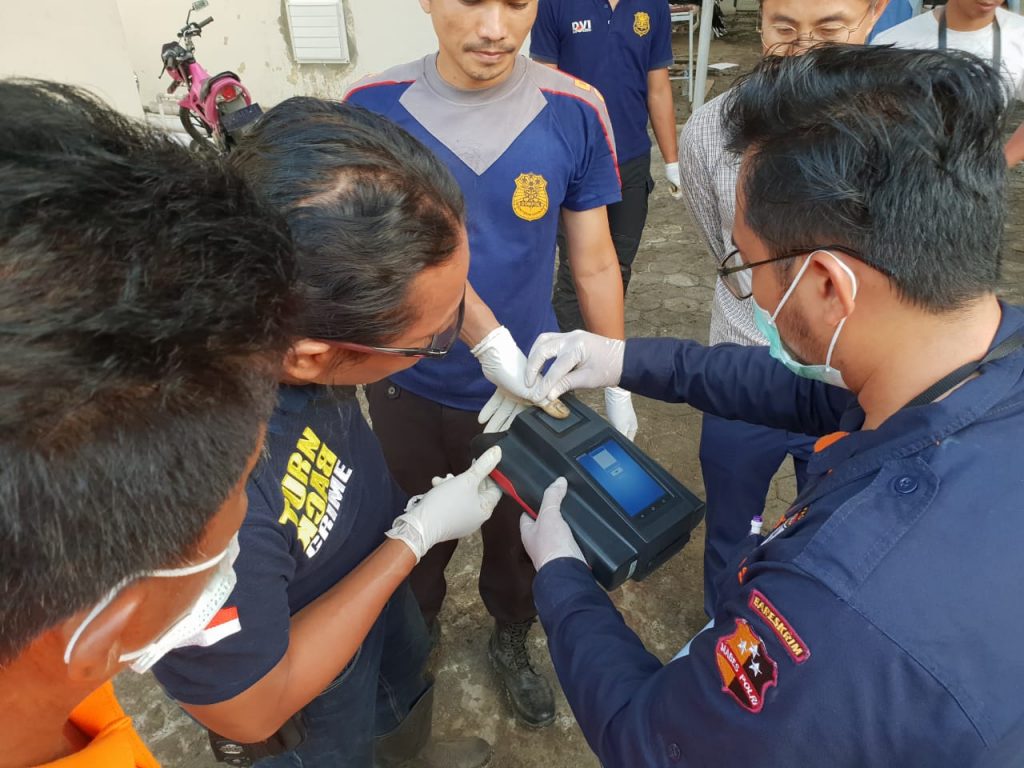UNAIR NEWS – Five Universitas Airlangga Postgraduate School students took part in forensic identification of casualties of the earthquake and tsunami in Palu and Donggala, Central Sulawesi. They come from forensic science master’s students who are moved to help casualties of disaster happening on Friday, September 28, 2018,.
One of the five forensic science students was Pudji Hardjanto. According to Pudji, Five UNAIR forensic science students joined the National Police Headquarters Disaster Victims Identification (DVI) team to perform the identification function of the casualties. There are more than 800 bodies identified. Within a day, about 100 bodies were identified.
In the early days after the disaster, the decay of the remains was seemed normal. However, he continued, on the third day and onwards, the conditions were getting worse.
The DVI team only relies on fingerprints, and the property attached to the corpse’s body. However, most of the clothes were separated from the bodies. One of the bodies identified was a foreigner from Korea, through fingerprints.
“Many bodies were found clotheless. So, we only rely on fingerprints, “he said.
Forensic identification was carried out at the hospital. Bhayangkara Palu. Because, explained Paudji, many bodies that are not all can be identified properly.
“In addition to UNAIR forensic students, other teams working under the police, including forensic students from the University of Indonesia, Hasanuddin University, and Diponegoro University,” he said.
“At the moment, forensic identification has been stopped because it is difficult to recognize the bodies. The only thing is through DNA, but it takes time and samples, ” he added.

Pudji said that the DVI team identified if there were conflicts regarding the law. For example, when bodies were claimed by two families due to similar characteristics.
Now UNAIR forensic students with the DVI team are waiting for identification if there is indeed a conflict. While waiting for them, the team carried out social functions by visiting refugees and contributing aid to refugees as UNAIR supported in the form of tents and food ingredients.
“Hopefully, what we do here helps the forensic works. We can further help the community here, both in the form of material and morals, ” said Pudji.
“When we meet refugees, we communicate with them, give good wishes, encourage them that we all help various elements. Beside, in the future, the good name of UNAIR can be recognized by the alma mater and the community, “he added.
The latest conditions in Palu-Donggala, the economic activity is improving. Food vendors start to exist. The shop starts to open. Electricity and fuel are available. Aid is easily found.
Meanwhile, Vice Director I of UNAIR Postgraduate School Prof., Dr., Anwar Ma’ruf, drh., M. Kes confirmed that there were five students left for Palu. The five students departed with a permission from the leadership including from UNAIR Community Service Board (LPM).
“They have coordinated with the leadership. And, I coordinated with the Head of LPM UNAIR. There are others who want to join from UNAIR, such as from psychology, especially related to trauma healing, “he said.
Prof. Anwar hoped that forensic students will be able to help our brothers and sisters in Donggala properly. Because, the power of forensics is needed in such a disaster.
“There, students can help while learning,” he said.
Previously, for the disaster happened in Lombok, there are UNAIR forensic studentsleaving for Lombok individually. In addition, Head of UNAIR Postgraduate School Disaster Management Program, Christrijogo Sumartono, dr., Sp.An.KAR, was also there with Ksatria Airlangga Floating Hospital.
“So, when there is a disaster like this, UNAIR Postgraduate School actively provides assistance. Both in terms of disaster management and forensics, “he said. (*)
Author: Binti Q. Masruroh
Editor: Feri Fenoria





